
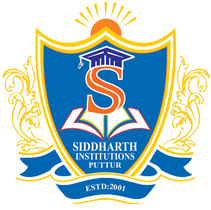

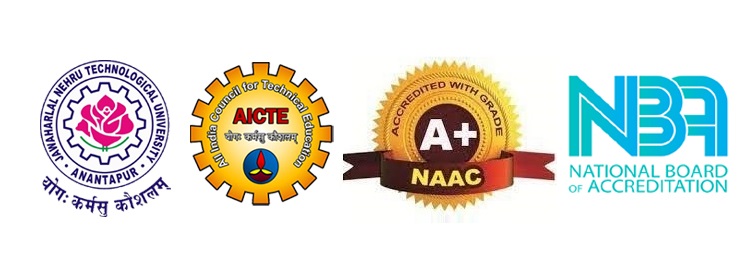








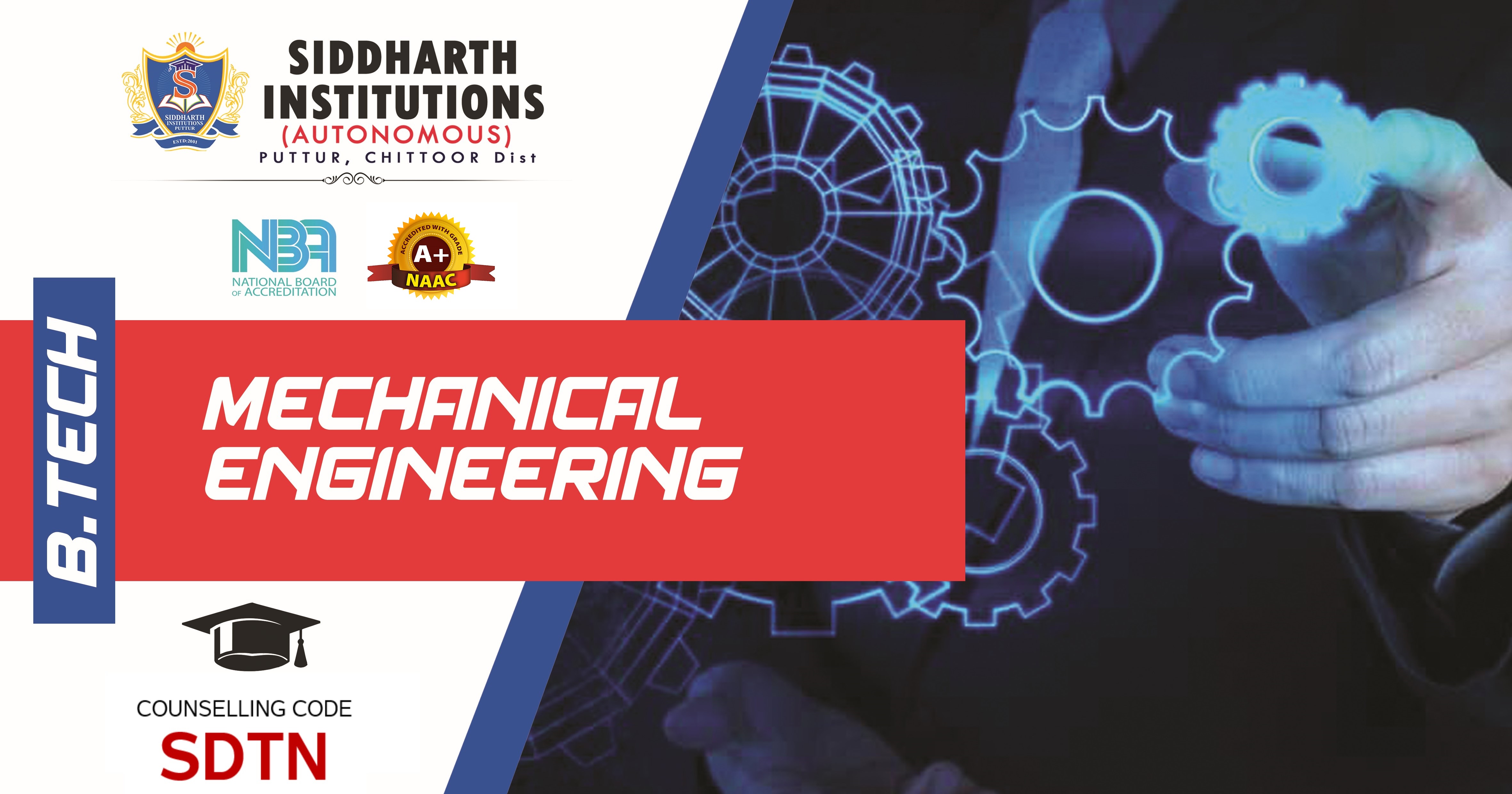
The department of MECHANICAL ENGINEERING is one of the vibrant departments of Siddharth Institute of Engineering & Technology, which offers B.Tech Mechanical Engineering and M.Tech Thermal Engineering. The department was established in 2004 with 60 UG students Intake and now running with 120 Intake.
The PG course Thermal Engineering has started in the year 2012 with an Intake of 18. The department is headed by Dr.S.SUNIL KUMAR REDDY who has more than 26 years of teaching experience. The Department is rich in term of faculty members who has vast teaching, Industrial and Research experience with an average teaching experience of 10 years. The Department has 12 members with Ph.D and 07 pursuing their research in various prestigious Universities.
Research Center has been sanctioned by Jawaharlal Technological University, Anantapur. The faculty published more than 300 papers in National and International Conferences/Journals. The major areas of research include Alternate Fuels, Combustion, Composite materials, Solar Energy etc.,
The Department has established Industry Academia Partnership with various manufacturing Industries in which the students will get trained on latest technology. Further the department in collaboration with Andhra Pradesh State Skill Development Corporation (APSSDC) established various labs i.e Design CBT lab, Refrigeration & Air Conditioning Lab, Automobile 2 wheeler and 4 wheeler labs. Dassault 3D experience lab is an asset for the department. In all these labs the students will be provided hands on experience to make them Industry ready candidate for various design and manufacturing companies. These infra facilities will cater the needs of UG and PG students.
The department is also having an agreement with IIT Tirupati, with which the faculty can obtain mentorship from them for their research projects. It consists of separate department library with an around 1000 books and the students will utilize this along with college central library.
The Department has conventional and research laboratories. The major drafting, modeling software in the department are AUTOCAD, CATIA, DELMIA, SILMIA, SOLID EDGE, etc.
The faculty inculcates discipline and responsibility among the students along with regular teaching. The department prepared advanced curriculum to students with the help of Industrial people.
To produce competent, ethical mechanical engineering professionals capable of working worldwide and transforming society for a better life with their research-based technology and entrepreneurial skills.
The primary mission of the Department of Mechanical Engineering is to impart high class education to the students by its three tenets to serve the society:
The Program Educational Objectives of the Mechanical Engineering are:
PEO1: Graduates with their profound knowledge of science and engineering fundamentals, are capable of identifying and providing innovative solutions to complex mechanical engineering designs and real-time problems, with a strong emphasis on environmental sustainability.The following are the program outcomes of Engineering Graduates:
PO1: Engineering knowledge: Apply the knowledge of mathematics, science, engineering fundamentals, and an engineering specialization to the solution of complex engineering problems.The following are the Program Specific Outcomes of Engineering Graduate:
PSO1: Able to apply mathematical and advanced CAD tools required for design analysis and manufacturing products.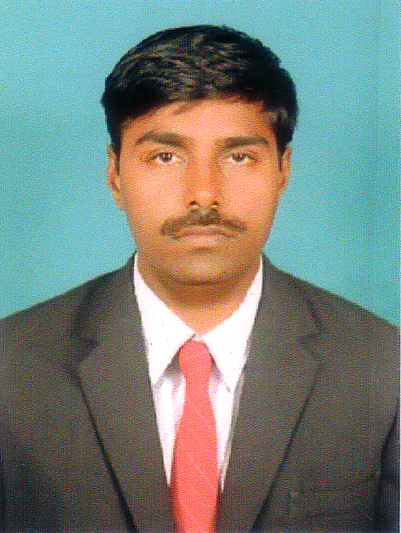
Dr. S.Sunil Kumar Reddy obtained his B.Tech degree from Sri Venkateswara University, Tirupati, M.Tech and P.hD both from JNTUA, Ananthapuramu. He has a teaching experience of 24 years and worked in various prestigious Institutions in A.P. He conducted many number of national and International symposiums. He is acting as Single Point of Contact (SPOC) for the labs established by Siemens and Dassault companies along with APSSDC. He is trained in Applied Robotic control lab under the initiative of Indo-European Skilling cluster for Mechatronics and Manufacturing at Achen, Germany
He published nearly 65 research articles in National and International Journals and Conferences. His area of expertise is in Thermal Engineering, Combustion and Alternate Fuels. In his service he has guided more than 40 UG projects and 20 PG projects. He is a recognized research guide for JNTUA and Veltech Rangarajan Dr.Saguntala R&D Institute of Science and Technology, Chennai. Under him three Ph.D research scholars are working on Alternate fuels and Diesel engine Combustion. He is a Life Member of various professional societies like ISOC, NDT, SAE and Institution of Engineers.
| S.No | Member Name | Designation / Organization | Role of Bos | Category of Nomination |
|---|---|---|---|---|
| 1 | Dr.S.Sunil Kumar Reddy | HOD | Chairman | Head of the Department |
| 2 | Dr. C. Sreedhar | Professor | Member | Faculty Members of each Specialization in the Department |
| 3 | Dr. F. Anand Raju | Professor | Member | |
| 4 | Dr. S. Suresh | Professor | Member | |
| 5 | Dr. P.Ramesh | Associate Professor | Member | ,|
| 6 | Dr.G.Jaya Chandra Reddy | Professor & Head YSR Engg College, Yogi Vemana University Prodattur, YSR Kadapa | Member | Subject Experts Nominated by the AC |
| 7 | Dr.N N Kishore | Professor Department of ME, IIT Tirupati, Tirupati | Member | |
| 8 | Dr.B.Durga Prasad | Director, Academic Audit,& Professor in ME JNTUCEA, Anantapuramu | Member | Subject Expert Nominated by VC |
| 9 | Mr.B.Madhu Prathap | Director, SIBAR Auto Parts,Industrial Est ate, Renigunta, Chittoor Dist. | Member | Representative from Industry |
| 10 | Mr.R.Bhaskar Reddy | Asst.Professor, SPMVV, Tirupathi, Chittoor Dist. | Member | Alumni (PG) Nominated by the Principal |
A good teacher can inspire hope, ignite the imagination, and instill a love of learning
| S.No | Name of the Faculty | Designation | Date of Joining | Qualification | Nature of Association | Profiles |
|---|---|---|---|---|---|---|
| 1 | Dr.S Sunil Kumar Reddy | Professor | 02/07/2014 | M.Tech., Ph.D | Regular | Profile |
| 2 | Dr.C Sreedhar | Professor | 02/06/2015 | M.Tech., Ph.D | Regular | Profile |
| 3 | Dr.Dara Sudhakara | Professor | 04/07/2022 | M.Tech., Ph.D | Regular | Profile |
| 4 | Dr.F Anand Raju | Professor | 01/05/2008 | M.Tech., Ph.D | Regular | Profile |
| 5 | Dr.Sonagiri Suresh | Professor | 04/07/2019 | M.Tech., Ph.D | Regular | Profile |
| 6 | Dr.B Vinod | Associate Professor | 01/07/2019 | M.Tech., Ph.D | Regular | Profile |
| 7 | Dr.Palamangalam Ramesh | Associate Professor | 07/01/2013 | M.Tech., Ph.D | Regular | Profile |
| 8 | Dr.Sreenivasulu Bezawada | Associate Professor | 14/06/2016 | M.E., Ph.D. | Regular | Profile |
| 9 | Dr.Anandan B | Associate Professor | 09/06/2015 | M.E., Ph.D | Regular | Profile |
| 10 | Dr. Renangi Sandeep | Associate Professor | 04/07/2022 | M.Tech., Ph.D | Regular | Profile |
| 11 | Dr.Mani J | Associate Professor | 01/07/2017 | M.E., Ph.D. | Regular | Profile |
| 12 | Dr.Parla Jaya Prakash | Associate Professor | 02/11/2016 | M.Tech., Ph.D. | Regular | Profile |
| 13 | Darsi Kishnaiah | Assistant Professor | 07/11/2012 | M.Tech. | Regular | Profile |
| 14 | Karthikeyan V | Assistant Professor | 01/07/2017 | M.E. | Regular | Profile |
| 15 | K Sai Sujith | Assistant Professor | 03/06/2019 | M.Tech. | Regular | Profile |
| 16 | Akula Suresh | Assistant Professor | 22/08/2011 | M.Tech. | Regular | Profile |
| 17 | Giriprasath P R | Assistant Professor | 01/06/2015 | M.E. | Regular | Profile |
| 18 | Sai Prasad. Kanchi | Assistant Professor | 12/08/2019 | M.Tech., | Regular | Profile |
| 19 | Shankar L | Assistant Professor | 27/07/2016 | M.E., | Regular | Profile |
| 20 | Asha A | Assistant Professor | 08/06/2012 | M.Tech., | Regular | Profile |
| 21 | J Suresh | Assistant Professor | 27/10/2016 | M.Tech. | Regular | Profile |
| 22 | TB Haribabu | Assistant Professor | 09/07/2018 | M.Tech. | Regular | Profile |
| 23 | Patnool Shaik Mohammed Sharook | Assistant Professor | 09/08/2021 | M.Tech. | Regular | Profile |
| 24 | B A Devan | Assistant Professor | 26/06/2012 | M.Tech., | Regular | Profile |
| 25 | A R Inbaraj | Assistant Professor | 04/07/2022 | M.Tech. | Regular | Profile |
| 26 | Mayaluri Sudheer | Assistant Professor | 22/08/2022 | M.Tech. | Regular | Profile |
| 27 | GV Dellibabu | Assistant Professor | 01/07/2023 | M.Tech., | Regular | Profile |
| 28 | P Vikram | Assistant Professor | 04/07/2022 | M.Tech. | Regular | Profile |
| 29 | T Cholairaj | Assistant Professor | 04/07/2022 | M.Tech. | Regular | Profile |
| 30 | V S Ravi | Assistant Professor | 04/08/2022 | M.Tech., | Regular | Profile |

In this Engineering Workshop the students will be provide theoretical and practical knowledge of manufacturing environment. This will introduce a new idea, inspire students to further explore it on their own, or may illustrate and promote actual process practice.
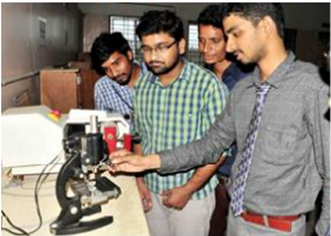
The objective of a Materials science lab is to predict and control material properties through an understanding of atomic, molecular, crystalline, and microscopic structures of engineering materials. In this lab the students will prepare the sample workpiece and test them in microscopes for structures.
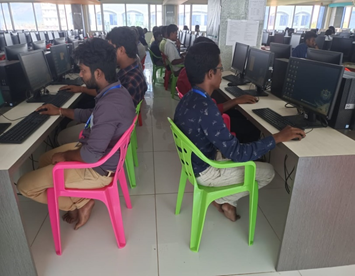
In this lab the students will develop and analyze the designs of various mechanical components using 2D and 3D Software. The major software used in the lab is AUTOCAD/CATIA/DELMIA/SIMULIA. The basic knowledge of this can be used for successful accomplishment of project works.
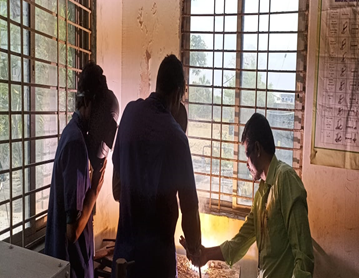
Manufacturing Technology Laboratory is a well-equipped laboratory which provides ideas on the practical knowledge of several manufacturing processes used in the Industry. The major processes are casting, pattern usage, mould creation and welding.
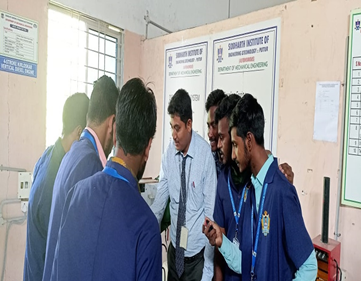
In this laboratory, students will have the opportunity to study the working principle of IC engines (both SI and CI engines), performance and characteristics, economical speed variations, air fuel ratio influence on the engine. Here the student perform required tests, analyze subsequent data, and present the results in a professionally prepared report.
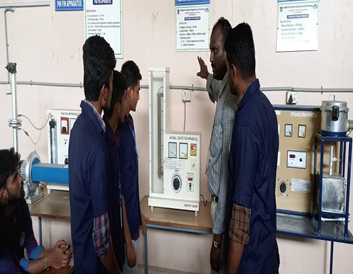
Heat Transfer laboratory provides fundamental and industrial knowledge about modes of heat transfer, like conduction, convection and radiation, and their application. In this the students will perform experiments on heat exchangers, boiling and condensation, Emissivity apparatus and Pin Fin Apparatus.
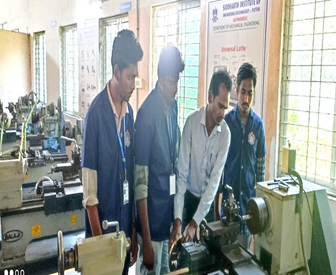
This laboratory provides an introduction to the Know-how of common processes used in industries for manufacturing parts by removal of material in a controlled manner. The emphasis throughout the laboratory course will be on understanding the basic features of the processes and acquiring skill in the operation of machines.
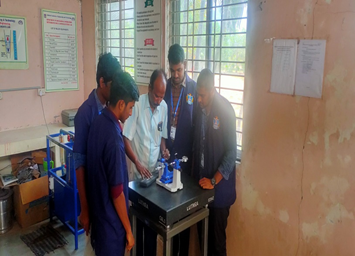
The objectives of this lab is to: Learn the main principle on which different instruments operate and provide hands on experience on them. Generate knowledge and skill in use of precision instruments. Learn a basic understanding of various instruments used in linear and angular measurements.
| S.No | Course | Particulars | Number of Rooms | Name of Room | L x B of the Per Class room in Meter | Per Class room in Meter Square | Total Carpet area of Room (sq.m) |
|---|---|---|---|---|---|---|---|
| 1 | B.Tech | Class Rooms | 10 | D-101, D-102, D-103, D-104, D-202, D-203, D-204, D-205, D-302, D-303 | 8 * 9.10 | 72.8 | 651.81 |
| 2 | B.Tech | Drawing Hall | 4 | D-301,D-402,D-404, D-405 | 12.60 * 12.07 | 152.082 | 456.246 |
| 3 | B.Tech | Tutorial rooms | 2 | D-306,D-307 | 5.93 * 9.10 | 53.963 | 107.926 |
| 4 | B.Tech | Manufacturing Technology Lab | 1 | W-101 | 8.54 * 8.54 | 72.94 | 72.94 |
| 5 | B.Tech | Material Sciences and Metallurgy Lab | 1 | W-102 | 8.54 * 8.54 | 72.94 | 72.94 |
| 6 | B.Tech | Thermal Engineering- Lab | 1 | W-103 | 10.37 * 7.625 | 79.01 | 79.01 |
| 7 | B.Tech | Heat Transfer Lab | 1 | W-104 | 11.9 * 6.405 | 76.1 | 76.1 |
| 8 | B.Tech | Instrumentation and control System and Metrology and Measurements | 1 | W-105 | 11.9 * 6.405 | 76.1 | 76.1 |
| 9 | B.Tech | Machine Tools Lab | 1 | W-108 | 12.505 * 9.15 | 114.375 | 114.375 |
| 10 | B.Tech | Engineering Workshops | 1 | W-109 | 23.77 * 8.54 | 202.9 | 202.9 |
| 11 | B.Tech | CAD/CAE Lab | 1 | Design CBT Lab | 11.10 * 13.70 | 152.07 | 152.07 |
| 12 | M.Tech | Thermal Engineering Class Rooms | 2 | D-302,D-303 | 8 * 9.10 | 72.8 | 145.6 |
| 13 | M.Tech | Advanced CAD Lab | 2 | Dassault 3D Experience Center | 11.8 * 6.65 | 78.47 | 156.94 |
| Grand Total |
2276.94 |
||||||








Student mentoring system
Envision and Execution by Association Activities
Remedial classes for low performed students
Conducting guest lectures/seminars and workshops on cutting edge technologies
Concept teaching with instructional models
Creating awareness for higher studies, EDC, Placements etc.,
Special training to students once the campus drive is planned
Rewarding the student toppers
Skill oriented training will be provided to students
Regular Internships and Industrial visits
Motivating the staff to apply for funding projects
Encouraging the staff for paper publications
Encouraging the staff to participate in conferences, FDP and workshops
Encouraging the staff for higher studies
The department of mechanical engineering is integrated with various industries for the academic curriculum preparation, Internships and Industrial visits. Some of the companies installed industrial labs in the campus for the purpose of providing training to students on cutting edge technologies and make them industry ready or self-sustain in the life.
| S.No. | Name of the Lab | Name of the company | Purpose |
|---|---|---|---|
| 1 | Automobile 4 Wheeler Lab | APSSDC-SIEMENS | For Training students on four wheeler repair and maintenance |
| 2 | Automobile 2 Wheeler Lab | APSSDC-SIEMENS | For Training students on two wheeler repair and maintenance |
| 3 | Refrigeration & Air conditioning Lab | APSSDC-SIEMENS | For Training students on Refrigeration & Air conditioning systems repair and maintenance |
| 4 | Design CBT Lab | APSSDC-SIEMENS | For providing training on latest 2D drafting and 3D modeling software like SOLID EDGE. |
| 5 | Dassault 3D Experience center | APSSDC-DASSAULT | For providing training on latest 3D modeling, Analysis and Simulation software like CATIA, DELMIA and SIMULIA. |
| 6 | CM Skill Center | APSSDC | For providing training on cutting edge technologies like AUTOCAD, ROBCAD etc., |
| 7 | SIBAR AUTO PARTS | Internship, Projects and Industrial Visits | |
| SRIKALAHASTI PIPES | Internship, Projects and Industrial Visits | ||
| NELCAST | Internship, Projects and Industrial Visits | ||
| COCO-COLA | Internship, Projects and Industrial Visits | ||
| INDO-US MIM | Internship, Projects and Industrial Visits |